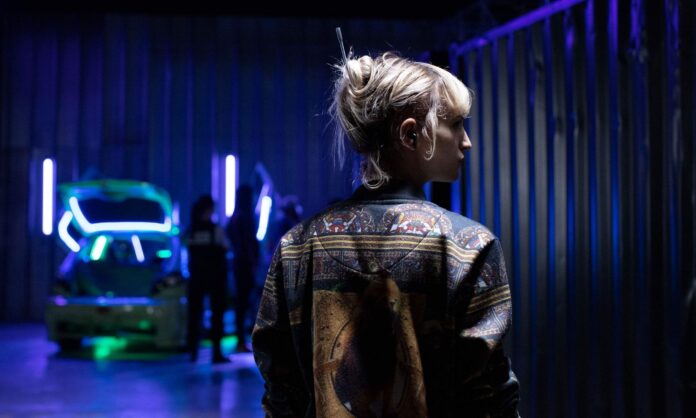Julia Duccounau is a provocative filmmaker. Each frame and each character is designed to evoke strong responses—disgust, sympathy, pain, sadness… Take, for instance, an ambiguous sequence in Raw, in which the protagonist Justine gets thrown into panic when an unknown force seems to strike her when she is in bed. The attack could well be within her head, but Duccounau makes it hard for us to differentiate between the real and surreal. This is an idiosyncrasy she carries forward in her second feature, Titane (Garance Marillier, who played Justine in Raw, also appears as a thankless character by the same name).
Director: Julia Ducournau
Cast: Vincent Lindon, Agathe Rousselle, Garance Marillier, Laïs Salameh
Streaming on: Mubi
The characters in Titane are real and so are their conflicts. The filmmaker treats this film as an antithesis to a fairytale; we follow Alexia (Agathe Rousselle) from her childhood’s definitive incident to the closure it leads to years later as an adult. This coming-of-age journey is riddled with grotesque events, with each bringing us a step closer to her. The idea of juxtaposing graphic imagery with an equal measure of calm—at times, cutting unexpectedly between scenes to establish the contrast—distinguishes Duccounau from Cronenberg and Noe.
Titane—if you have managed to dodge plot points on social media to date—does have an unusual story, one rooted in the psyche of Alexia, literally. An injury due to a car accident necessitates that a titanium plate be fitted in young Alexia’s head. When she exits the hospital, she ignores her parents and embraces the car, physically. This act of love sees a rather more physical iteration when an adult Alexia has intercourse with a Cadillac (you read it right). Alexia learns she is pregnant (Again, you read it right).
The first hour of Titane is an eccentric, intense watch. Alexia gratuitously murders people—which could be an impulse or a morbid fascination. Her indulgence results in the film’s only darkly comic moment, when she learns there are more people in a house where she is on a murder spree, meaning she has more bodies to count. It’s fascinating how Duccounau chooses to stage this brutal homicide: the first kill is framed in a static wide, illustrating the indifference of Alexia; she then employs two single shots for other kills, the cameras only shaking to represent the victims’ quandary in their last moments. When the focus gets back to Alexia, the rapid movement eases. It’s gory, but the impact it leaves on you pales in comparison to the moments that accentuate Alexia’s pain. Close-ups come into play during her most vulnerable, distressing and physically painful moments, making for some uncomfortable viewing. And yet, for a film that uses every opportunity to underscore the protagonist’s pangs and the violence she unleashes, it often surprises you with unexpected tenderness.
The film’s heart lies in something twisted and unusual. It’s heartening to see Alexia (following a complete make-over) pretend to be Andrie, a young man reuniting with his father Vincent (a marvelous Vincent Lindon) after going missing as a child. This father-son/daughter dynamic sweeps you with its meditative tone and like Alexia, Titane evolves into a different film post the halfway mark.
The focus is no longer on pain and emotional void—although we continue to sporadically see intense ‘body horror’ scenes—but on uncanny bondage and acceptance. Alexia also gets a tiny redemption arc, which is also perhaps the most profound scene in the film. Vincent, the fireman, has his son Adrien accompany him on one of his emergency rescue calls, and the latter aids in saving the life of an old woman. They both bond over performing CPR on the woman. Vincent is, without a doubt, the lifeline of both the protagonist and Titane, beautifully embodied by Lindon. Perhaps the only happy moment in the film comes in a party that follows, shot in neon-lighting and played to ‘Light House’, when Vincent embraces his son wholeheartedly. This is when we see Titane metamorphose into a compassionate tale of love.
Agathe Rousselle is fantastic as Alexia and Adrien. It’s wonderful to see her transmute this physical performance into a visceral act. It’s through her performance that you can sense the agony, both physical and mental; this is all wonderfully complemented by Ruben Impens’ frames.
Titane discomforts you with violence, but it also takes the remaining time to calm you. By the end, which sees the confluence of both these facets, you are left breathless—in a good way.

#Titane #Movie #Review #bodyhorror #masterpiece #heartfelt

